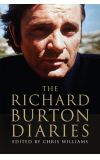
27 Dec 2012 01:01:17
The book would have been twice as long had Burton written it with any consistency: there are entries for only a single year (1960) between the schooldays and the post-Cleopatra years of 1965-72, and there are then two further sizable breaks in the 70s and 80s. But with his passion for literature, devotion to education and pride in the brief period spent teaching undergraduates at Oxford, Burton would have felt honoured to be published by Yale and to have had his book edited and annotated in a scholarly manner by Chris Williams, professor of Welsh history at Swansea University and former director of the Richard Burton Centre for the Study of Wales.
At the outset Williams raises the question of why Burton kept the diary and for whom. He suggests, rightly I think, that it was a form of personal and professional discipline, a way of sharpening his prose and his observational skills. As Burton claimed never to reread what he wrote, it doesn't appear to have been kept as an aide-mémoire. But there was money in it (Harry Evans, when editor of the Sunday Times, tells him at a Kissinger dinner party that he'd pay £34,000 for a series of extracts) and the probability of an autobiography. He's insecure about his writing, however, confessing in 1975 that "every word I write I suspect the next day". But five years later, in a relaxed mood while touring in a revival of Camelot, he notes: "I am writing to please myself, though there is a feeling in some place in my head that this may be publishable. I haven't been writing for nothing." It wasn't a secret diary, though, as every entry was read by Elizabeth Taylor, and it was partly kept to express his love for her and to assure her that their life together, however much it resembled The Taming of the Shrew, was secure. From 1965 until their divorce, she makes her own contributions, responding to his entries.
The school diaries have historical interest and great charm as they record, briefly and unpretentiously, a life of poverty uncomplainingly borne as the son of a drunken widowed miner working in a declining mining valley. We read of his love of sport (especially rugby), of books, moviegoing (something he gave up as an adult), playing Monopoly (replaced as a grown-up by a passion for Yahtzee), and attending chapel and taking a critical interest in the sermons. War breaks out; the bombers appear in the skies over south Wales and people die in air raids; a great teacher and student of the theatre, Philip Burton, becomes his guardian, and Richard adopts his name. This is a splendid pre-credit sequence to the big feature that is to be his life. The latter is a sad, sensational story of history repeating itself, first as Shakespearean tragedy on the screen, then as back-stage farce with the fallen hero and his serpent of the Nile playing ostentatious roles before the despised gossip columnists and the contemptible paparazzi, whom Burton calls the "butterflies of the gutter".
The diaries make for a patchy book. They're often tedious in their listing of menus, in the constant rants about how boring children are, and the guilt-ridden, breast-beating accounts of epic drinking and dispiriting hangovers. In 1975 the entries for five consecutive days consist of one word: "Booze". Too many productions go unmentioned, most notably of course the shooting of Cleopatra, to which he later wryly alludes, saying: "All the bad things that have ever happened to me have always happened in Rome." But his devotion to Taylor is passionate and pure, although of the "can't live with her, can't live without her" variety. The jewels, the private jet, the glamorous yacht packed with works by Picasso, Van Gogh et al are tokens of love, as well as trophies of fame. "How posh we are getting," he notes in 1966, but a year later calls himself and Taylor "a lovely, charming, decadent, hopeless couple". At the end her egotism, unreliability and drunkenness during the rehearsals of Private Lives prove too much.
There are occasional well-sustained passages (some vivid pages on a Rothschild ball, a touching little memoir on working at the BBC in the postwar years). The book comes most vividly to life when he's reflecting on specific aspects of the craft of acting, insisting for instance that Olivier, Guinness and Scofield are overly stagey compared with his own naturalism on both stage and screen. And it's at its liveliest when Burton's commenting on his friends, colleagues and acquaintances. He has something to say about everyone, most of it bad, bitchy and pithily expressed. Here are a few random characterisations. Joseph Losey: "arrogant ignorant fool". Franco Zeffirelli: "a ruthless, selfish, multi-faced, ego-mad coward". Warren Beatty: "very selfconscious and actory. He's not out of the top drawer." Olivier: "a shallow little man with a mediocre intelligence but a splendid salesman". Designer Irene Sharaff: "bone-lazy, inflexible, faintly condescending to most people, an intellectual (though she's not overblessed in that department) snob and a crashing bore". Robert Shaw: "Anyone can play Henry VIII: I mean even Robert Shaw… has played it." Ken Tynan: "a stammering and stuttering skeletonic death's head. Ken has always looked like Belsen with a suit on. Dachau in Daks. Buchenwald in brown velvet."

